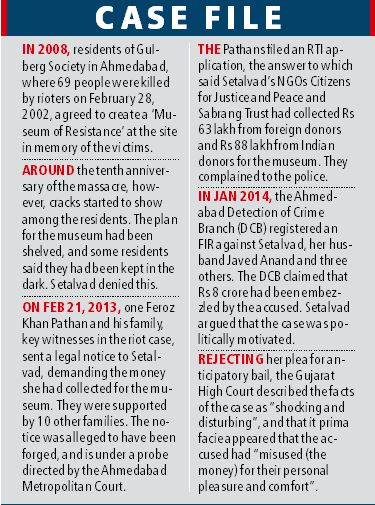Stay updated with the latest - Click here to follow us on Instagram
NGO funds: Underlining liberty, SC shields Teesta, husband from arrest
The apex court also grilled the Gujarat police over its insistence on their arrest.
 Teesta and Javed were compelled to move the Supreme Court after the High Court rejected their anticipatory bail plea.
Teesta and Javed were compelled to move the Supreme Court after the High Court rejected their anticipatory bail plea.
The Supreme Court on Thursday granted protection to activist Teesta Setalvad and her husband Javed Anand from arrest by Gujarat police till further orders in a case of alleged fraud relating to funds received by two trusts of which they are the main office-bearers.
Also Read: Rights activists question Gujarat’s ‘insistence’ on arresting Teesta Setalvad
The court also expressed an inclination to grant them bail, observing that “liberty is paramount and cannot be put on a ventilator” when custodial interrogation is not imperative.
Also Read: Teesta proposes more papers, HC disposes
During an almost two-hour-long hearing, a bench of Justices Dipak Misra and Adarsh K Goel asked Gujarat police to explain why custodial interrogation was needed for Setalvad and Anand in a case that “prima facie appeared to be a case of mismanagement of fund” and could not be called a “serious and big scam”.
Also Read: New SC bench to hear bail plea in Teesta case
“Liberty is paramount for us. Liberty is on one hand and on the other hand are the allegations, nature of the crime and its impact. There may be financial irregularities or alleged embezzlement of funds, as mentioned in the FIR, but is it a case where liberty of a person is to be curtailed?” the bench asked senior advocate Mahesh Jethmalani, who appeared for Gujarat police.
Also Read: Charges relate to salaries for family, credit card purchases
The Gujarat police, however, pleaded with the court not to show indulgence to those who had shown “arrogance” and “contempt for the law”, and claimed that granting bail could mean laying down a new jurisprudence in criminal law and reduce custodial interrogation to a “mere euphemism”.
#Teesta: SC asks her adv Kapil Sibal not to “act smart;” Sibal replies he hasn’t acted smart with judges in 42 yrs of career. @IndianExpress
— Utkarsh Anand (@utkarsh_aanand) February 19, 2015
#Teesta:Gujarat police concedes in SC not to press charges of forgery and Information Technology Act violation against couple.@IndianExpress
— Utkarsh Anand (@utkarsh_aanand) February 19, 2015
#Teesta:SC says Teesta must give all documents relating to donors & co-operate with police in case it agrees to give her bail.@IndianExpress
— Utkarsh Anand (@utkarsh_aanand) February 19, 2015
The case involves funds received by Sabrang Trust and Citizens for Justice and Peace (CJP) for building a memorial at the Gulbarg Co-operative Housing Society (GCHS) in Ahmedabad for victims of the 2002 riots in Gujarat.
While senior advocate Kapil Sibal, who represented Setalvad and Anand, was required to argue for bail only for a few minutes at the beginning, Jethmalani argued for most of the hearing as the bench kept asking him to justify the need for custodial interrogation.
Jethmalani contended that police had received a complaint in February 2013 from 12 residents of GCHS, accusing Teesta of defrauding them and misusing funds meant for the memorial.
He claimed that police were “careful” and lodged an FIR almost a year later, in January 2014, since Teesta and Javed allegedly did not cooperate with the investigators and sought to tamper with the witnesses.
Underlining that the accusations were confined to misuse of funds, the bench questioned Jethmalani about the rationale for invoking sections 467 (forgery for cheating) and 420 (cheating) of the IPC, and Section 72A of the Information Technology Act that related to a breach of contract.
Jethmalani then conceded he would not press those charges. But he maintained that Section 406 of the IPC was still relevant since there was a breach of trust and Setalvad had sought to defraud the “unfortunate victims of riots by raising the money in their name”.
The bench responded: “Even if there may be a case made out under Section 406, what can be the need to arrest them? Who the petitioner is, is absolutely irrelevant for us. It is a question of liberty. Liberty is not absolute and it has to be balanced. But at the same time, it cannot be put on a ventilator in an ICU.”
It asked what the Gujarat police’s difficulty could be if Teesta was ordered to hand over all requisite documents and show up for questioning whenever required. It also made clear that anticipatory bail could not be denied on the ground that Teesta and Javed had refused to answer certain questions of police that could amount to self-incrimination.
Opposing this, Jethmalani said if the court chose to condone the conduct of the accused in this case, “it will give a license to everyone to treat police with contempt.” He further argued that laying down a law in this fashion would result in a dead end for all investigations since an accused would not be obliged to answer anything.
The bench, however, remained unimpressed and asked Sibal if his clients were ready to fully co-operate. Sibal responded that he was ready to provide an undertaking that Teesta and Javed would adduce all the documents and assist in the probe.
Stating that it would pass a detailed order later and that judgement was being reserved on the bail plea, the bench added that it would also allow police to move court for cancellation of bail in case of breach of conditions by the couple.
The bail plea was heard by the new bench less than a week after a bench of Justices S J Mukhopadhaya and N V Ramanna, while hearing the plea, dubbed the allegations against Teesta as “grave”.








